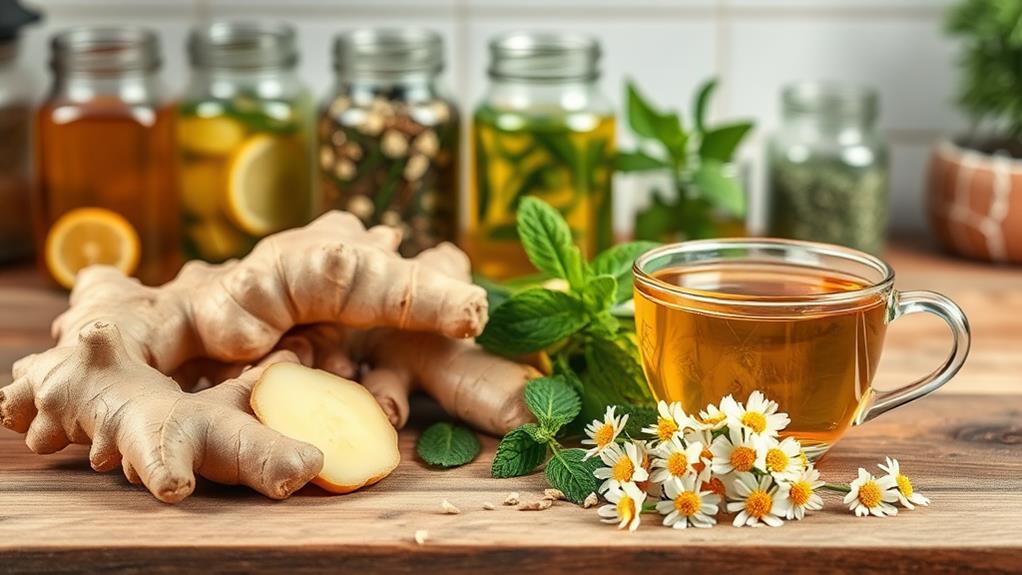If you've ever felt that uncomfortable fullness in your abdomen, you know how disruptive bloating can be. Thankfully, there are various natural remedies that can help alleviate this common issue. From herbal teas to mindful eating practices, you might find that simple adjustments can lead to significant relief. But what exactly are these remedies, and how can you incorporate them into your daily routine for lasting results? Let's explore the options that could help you regain comfort and balance.
Understanding Abdominal Bloating
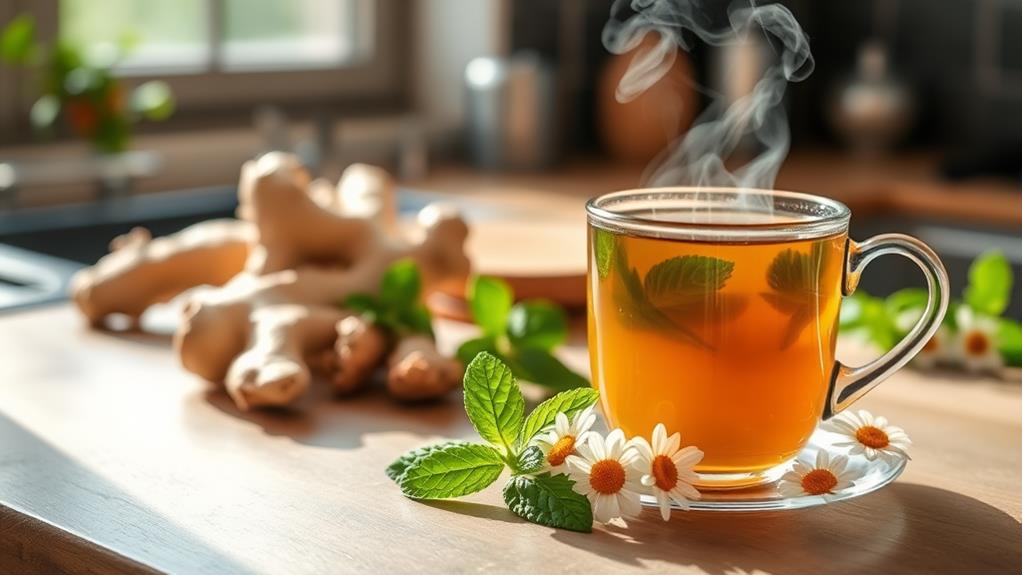
Abdominal bloating often leaves you feeling uncomfortable and overly full. It's that tight feeling in your belly that can make you want to unbutton your pants!
Bloating happens when there's excess gas in your digestive system or sometimes when your body retains fluid. It affects about 10% to 30% of people, and it can be tied to various digestive issues like constipation and irritable bowel syndrome (IBS).
You might notice certain food triggers making things worse, too. Foods high in FODMAPs, dairy products (if you're lactose intolerant), and those fizzy carbonated drinks can really crank up the gas in your belly.
Even habits like gulping down your food too quickly, chewing gum, or sipping through a straw can lead to swallowing air, contributing to that bloating sensation.
Keeping a food diary can be super helpful to pinpoint what's causing your discomfort. By tracking what you eat, you can spot patterns and identify those pesky food triggers.
Common Causes of Bloating
Bloating can stem from several common causes that you mightn't even realize are affecting your digestive health. One major reason is gas buildup in your gastrointestinal tract. This gas can come from swallowed air or from the fermentation of undigested carbohydrates by gut bacteria. If you've ever felt like a balloon after eating, you might be experiencing this!
Digestive issues like constipation and irritable bowel syndrome (IBS) can also play a big part in bloating. When your digestive system isn't working smoothly, it can lead to discomfort.
Food intolerances, such as lactose or gluten, can cause your tummy to protest too. If you're eating foods that don't agree with you, your stomach might let you know by getting bloated.
Don't forget hormonal changes! During your menstrual cycle, you might notice temporary bloating due to fluid retention.
Plus, if you've been indulging in salty snacks, sugary treats, or fizzy drinks, those can add to the problem by promoting water retention and more gas. So, keep an eye on what you eat and how you feel!
Dietary Influences on Bloating
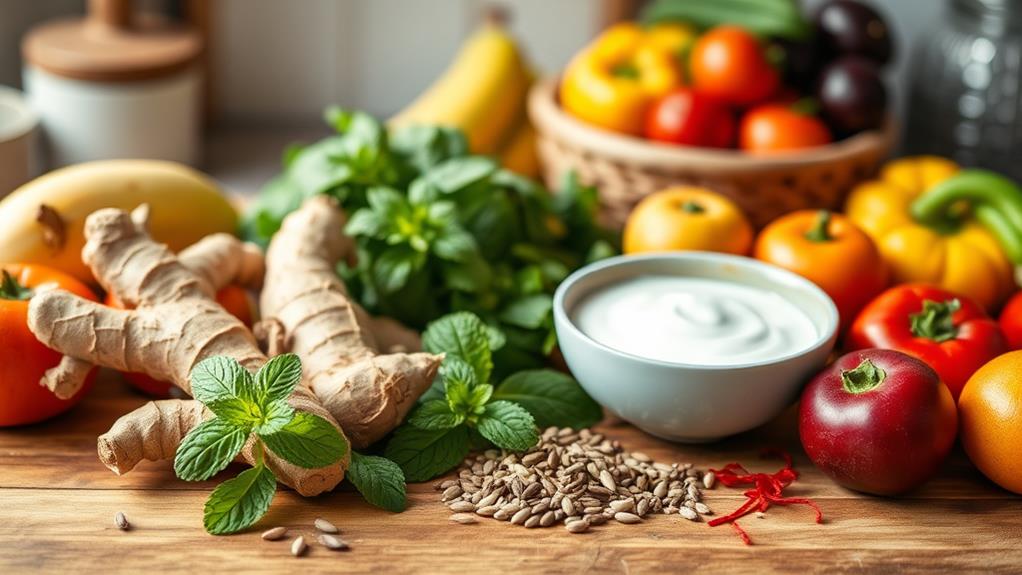
When it comes to your diet, what you eat can greatly impact how bloated you feel. Certain dietary influences can lead to gas and bloating, making you uncomfortable. Fizzy drinks, for example, are notorious for creating gas bubbles in your stomach. Excessive salt and sugar can also cause fluid retention, making your belly feel puffy.
Some foods, especially those high in FODMAPs like beans, certain fruits, and dairy, can be tricky for your gut. If you're sensitive, these foods can ferment in your stomach, leading to more bloating.
Plus, if you suddenly increase your fiber intake, your digestive system mightn't keep up, and that can worsen the situation. It's best to add fiber slowly.
If you're lactose intolerant, dairy products can be your enemy. Undigested lactose ferments and produces gas, leaving you feeling heavy.
To figure out your specific triggers, consider keeping a food diary. This simple tool can help you pinpoint which foods to avoid to reduce bloating and feel better overall.
Mindful Eating Practices
Your eating habits can play a significant role in how you feel after meals. If you want to reduce bloating, practicing mindful eating is a great place to start. When you eat slowly, you give your digestive system time to process food, which helps prevent abdominal bloating.
Try to focus on your meal without distractions like TV or your phone. This way, you'll really enjoy each bite and notice when you're full.
Using chopsticks or even your non-dominant hand can slow down your eating pace, making it harder to overeat. Plus, chewing your food thoroughly—around 30 times per bite—can break down those pesky food particles, easing the digestion process. It's like giving your tummy a helping hand!
Designating a specific sitting area for meals can also boost your mindful eating habits. This little trick encourages you to pay attention to portion sizes and makes meals more enjoyable.
Herbal Remedies for Relief
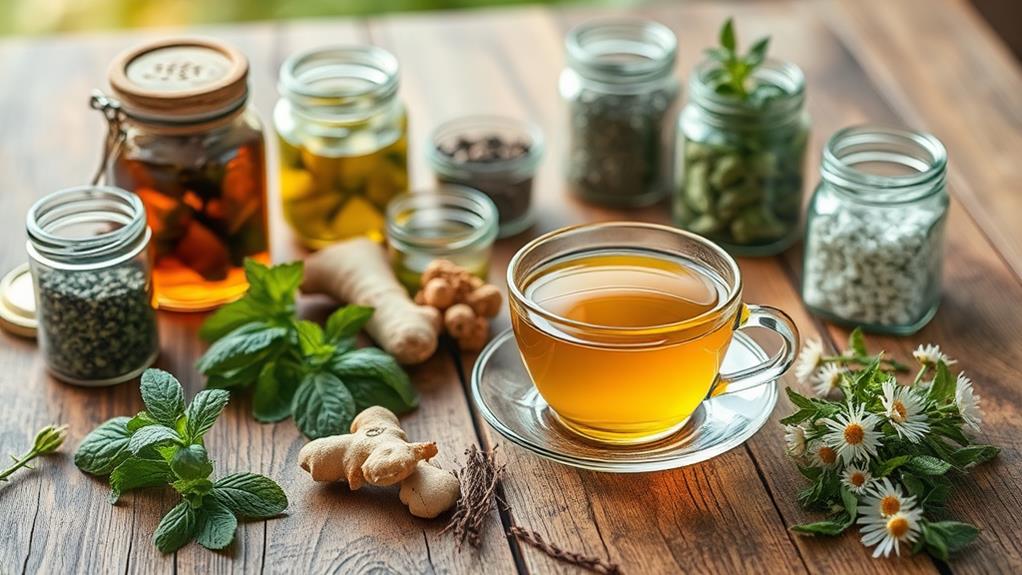
Have you ever considered how herbal remedies can ease the discomfort of abdominal bloating? It's true! Peppermint tea is a fantastic choice. It relaxes your intestinal muscles, helping gas pass through, which can really reduce bloating. Plus, it's super invigorating!
Then there's ginger, a natural superstar with anti-inflammatory properties. Drinking ginger tea or adding ginger to your meals can boost your digestion and help ease that bloated feeling.
Fennel seeds are another great option. They've got carminative properties, which means they help reduce gas, making them perfect for herbal teas or as a spice in your cooking.
Don't forget about chamomile tea! It soothes your digestive system and, like ginger, has anti-inflammatory effects that can help with gas and bloating.
And if you want to add a little spice to your life, turmeric could be your go-to. With its active compound curcumin, it's known to improve digestive health, reducing those pesky bloating symptoms.
Ginger Tea Benefits
Ginger tea stands out as a remarkable natural remedy for addressing abdominal bloating. When you sip on that warm cup of ginger tea, you're not just enjoying a tasty drink; you're also helping your digestive system! The active compounds in ginger, like gingerol and shogaol, work wonders by stimulating your digestive tract. This means they help move food along, easing any discomfort.
If you're dealing with gas, ginger tea can be your best buddy. It helps reduce gas and provides bloating relief by relaxing the muscles in your intestines and lowering inflammation in your gut.
Plus, studies show that regular consumption of ginger tea can enhance nutrient absorption, making your tummy happy and healthy!
You might be surprised to learn that ginger tea can also help with nausea and other gastrointestinal discomforts. So, next time you feel bloated, brew yourself some ginger tea. It's like giving your stomach a gentle hug!
Peppermint Tea for Digestion
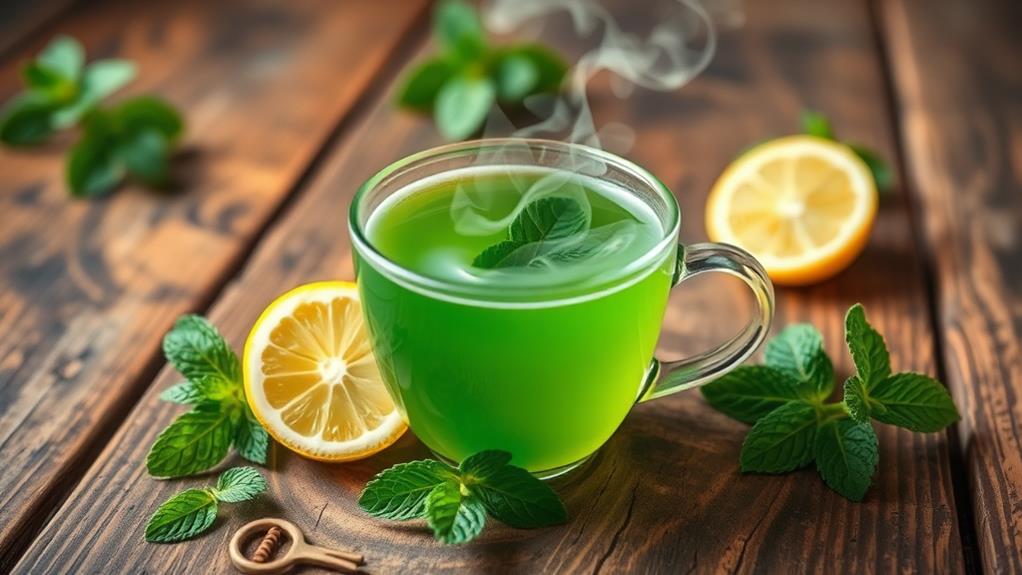
Peppermint tea is a powerful ally for digestion, especially when it comes to easing bloating. This delightful brew contains menthol, which helps relax the muscles in your gastrointestinal tract. When you sip on peppermint tea, you may find relief from gas discomfort and that overly full feeling you sometimes get after meals.
If you struggle with irritable bowel syndrome, you'll be happy to know that peppermint tea can help, too. Research shows it can ease those pesky IBS symptoms, including bloating. Drinking this fragrant tea might also boost bile flow, making fat digestion smoother and reducing bloating.
Plus, peppermint tea has anti-inflammatory properties that can soothe irritation in your digestive system. Enjoying a warm cup after meals is a great way to promote your overall digestive health. It can help reduce gas production, keeping your tummy happy and content.
Importance of Hydration
Staying properly hydrated is essential for your digestive health, especially when it comes to preventing bloating. Drinking enough water—about 64 ounces a day—can make a big difference.
When you're well-hydrated, your body can digest food more easily, helping break it down and reducing that uncomfortable feeling of fullness. Plus, hydration supports your kidneys, which work hard to flush out excess sodium and fluids that can lead to bloating.
It's also a good idea to sip some water before meals. This simple step can help kick-start your digestion and keep things moving along smoothly.
If plain water isn't your thing, don't worry! You can enjoy herbal infusions like peppermint or ginger tea. These not only keep you hydrated but also soothe your stomach, making them a perfect combo for tackling bloating.
Gentle Physical Activities

Engaging in gentle physical activities after meals can work wonders for alleviating bloating. Just a simple 10-15 minute walk can help reduce bloating by promoting digestion and easing gas buildup. It's like giving your tummy a little hug!
Activities like swimming or biking are also great, as they enhance gut motility and help prevent that uncomfortable feeling from coming back.
You don't have to turn into a gym rat, either. Mindful movements, like tai chi or gentle stretching, can work wonders. They not only make your body feel good but also help with stress-related digestive issues, which can really contribute to bloating.
Yoga Poses for Bloating
Yoga poses can be incredibly effective for relieving abdominal bloating and discomfort. If you're feeling gassy and uncomfortable, some simple poses might just do the trick!
Child's Pose and Happy Baby Pose are great for gently compressing your abdomen, helping to release trapped gas and promote digestive movement. You'll be amazed at how good these can feel!
Twisting poses, like seated spinal twists, can boost circulation and get your digestive organs working better. It's like giving your insides a little tune-up!
Forward bends, such as Uttanasana (Standing Forward Bend), apply pressure on your belly, making it easier for gas to move through.
Don't forget that regular yoga practice not only helps with flexibility but also encourages relaxation. Less stress means less bloating, so you can be comfy again.
Pairing breathing exercises with these yoga poses can really amp up your digestion. So, take a deep breath, strike a pose, and let your tummy thank you later!
Abdominal Massage Techniques

If you've found relief through yoga but still struggle with bloating, abdominal massage techniques can offer additional support. These gentle movements can stimulate your digestive tract, helping to reduce bloating and move trapped gas along.
Try using circular motions in a clockwise direction; this mimics how your intestines work naturally. It's like giving your tummy a little dance party!
To really boost the benefits, incorporate deep breathing while you massage. It helps you relax and eases tension in your abdomen, making everything flow better.
You might also want to use essential oils like peppermint or ginger. Not only do they smell nice, but they can also soothe your stomach and help reduce bloating.
Regular abdominal massage can be especially helpful for folks dealing with IBS or chronic bloating.
So, next time you're feeling uncomfortable, take a few moments to pamper your belly. It's a simple and effective way to feel better, and who doesn't want a happy tummy?
Warm Compress Application
A warm compress can be a simple yet effective way to soothe abdominal discomfort caused by bloating. When you apply heat to your belly, it helps relax the muscles and relieve discomfort. This warmth promotes blood flow to the abdominal area, which can stimulate digestion and ease cramping.
So, if you're feeling that annoying tightness or fullness, a warm compress might just be your new best friend!
You can use a heating pad, a hot water bottle, or even a cloth soaked in warm water. Just make sure it's at a comfortable temperature—no one wants to turn their belly into a lobster! Aim to keep the compress on for about 15 to 20 minutes for the best results.
This soothing heat not only helps reduce bloating but also calms stress and tension in your tummy. Plus, it's like giving yourself a little spa treatment right at home.
Who wouldn't want that? So the next time you're feeling bloated, grab that warm compress and let the magic happen. Your belly will thank you!
Gradual Fiber Addition
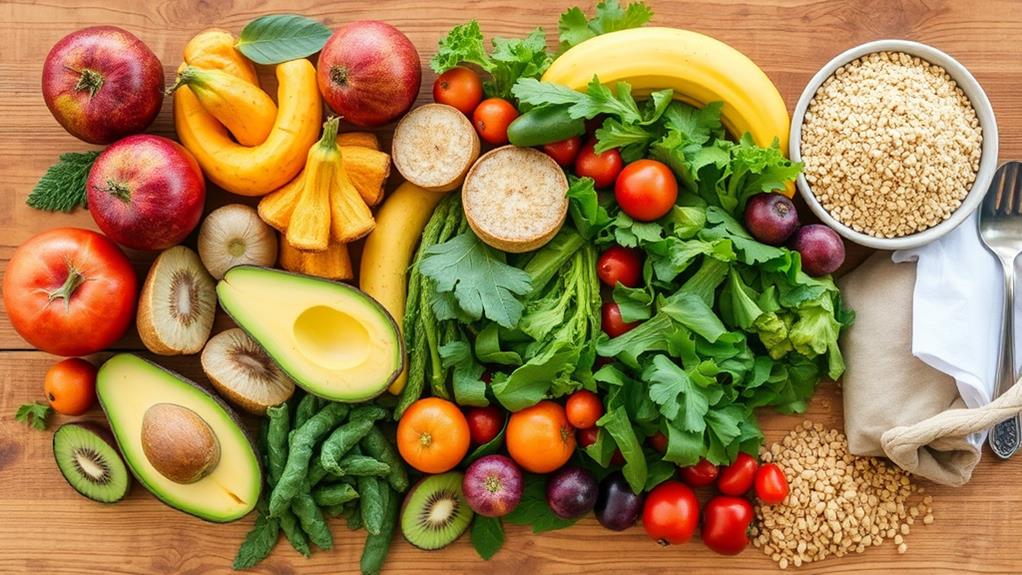
Feeling bloated often leads to seeking immediate relief, and while a warm compress can work wonders, addressing your diet is another key step.
One effective way to tackle bloating is through gradual fiber addition. When you slowly increase your fiber intake, your digestive system has time to adjust. This helps reduce the gas and discomfort that can come from a sudden spike in high-fiber foods.
Aim for about 25 to 30 grams of fiber each day to promote regular bowel movements without overwhelming your digestive tract. Start by incorporating high-fiber foods like legumes, whole grains, and fruits into your meals, but do it slowly. Your body will thank you for it!
Keeping a food diary can also be helpful. Jot down what you eat and see if certain foods trigger bloating.
Don't forget to drink plenty of water—at least 64 ounces daily! This is super important to support digestion and prevent constipation.
Probiotics for Gut Health
For anyone struggling with bloating, incorporating probiotics into your diet can be a game changer. Probiotics are live microorganisms, but don't worry, they're the good guys! They help restore the natural balance of gut bacteria, which is essential for gut health.
Eating foods rich in probiotics, like unpasteurized yogurt, sauerkraut, and kefir, can enhance your digestion and help reduce bloating.
A 2020 study found that probiotics can remarkably cut down on symptoms of IBS, including abdominal bloating, by about 40%. Isn't that amazing?
If you have digestive disorders, certain probiotic strains, like Lactobacillus and Bifidobacterium, can be especially helpful. They're like tiny superheroes, fighting off gas and bloating!
Low-FODMAP Diet Approach
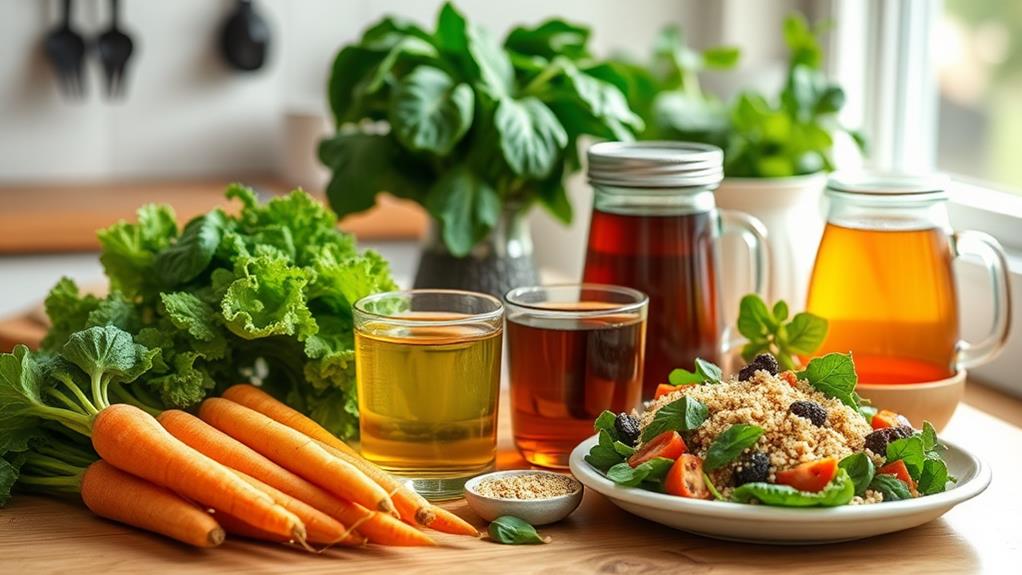
Probiotics might help restore gut health, but if you're still experiencing bloating, consider the low-FODMAP diet as another effective strategy. This diet's all about cutting back on fermentable carbohydrates that can cause discomfort. By limiting high-FODMAP foods like certain fruits, vegetables, legumes, and dairy, you can really reduce symptoms of bloating and other tummy troubles.
The low-FODMAP diet works in three phases. First, you eliminate those high-FODMAP foods. Next, you slowly reintroduce them to figure out which ones your body doesn't like. Finally, you personalize the diet based on what you can tolerate. It's like a fun puzzle, but with food!
Before you jump in, it's a smart idea to consult a healthcare provider or dietitian. They can help you implement the diet properly and keep an eye on your nutritional needs.
Reducing Salt Intake
Salt can be a sneaky culprit behind abdominal bloating. When you eat too much salt, your body holds onto extra water, which can lead to uncomfortable fluid retention. This swelling can make your belly feel tight and full, yikes!
To tackle this issue, try to reduce your salt intake. Most adults should aim for less than 2,300 mg of sodium each day. Processed and packaged foods are often loaded with salt, so stick to fresh, whole foods whenever you can.
Incorporating diuretic foods like cucumbers, celery, and lemons can also help. These foods help flush out excess sodium from your system, making it easier to combat bloating.
Keeping a food diary is a smart idea too! It can help you spot high-sodium foods in your diet, which you can then manage better. If you take a closer look at what you're eating, you'll soon be on your way to feeling lighter and more comfortable.
Avoiding Gas-Producing Foods
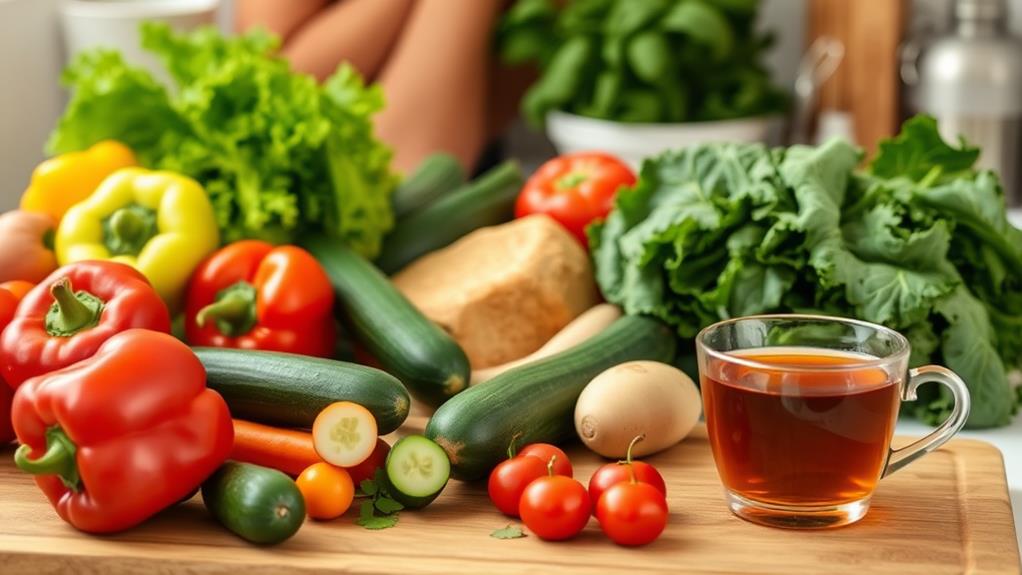
Your diet can play a considerable role in the discomfort of abdominal bloating, especially when it comes to gas-producing foods. If you want to feel better, it's wise to steer clear of certain items.
Foods high in raffinose, like beans, broccoli, and cabbage, can create a lot of intestinal gas during digestion. That's not the kind of company you want in your stomach!
Dairy foods can also be tricky, especially if you're lactose intolerant. They can cause gas and bloating because of lactose fermentation in your gut.
And let's not forget about those bubbly carbonated drinks. They introduce extra air into your system, making bloating even worse.
Sugar-free snacks may seem like a great choice, but watch out for artificial sweeteners like sorbitol and mannitol. They're poorly absorbed and can lead to unwanted gas, too.
A low-FODMAP diet is another option. It focuses on reducing fermentable carbs, which can considerably ease bloating symptoms, especially if you have IBS.
Tracking Food Triggers
Identifying food triggers is essential for managing abdominal bloating effectively. One great way to do this is by keeping a food diary. This simple tool helps you track what you eat and when you experience bloating symptoms. By writing down your meals, you can spot patterns in your dietary choices.
Maybe you notice that dairy products make you feel bloated, or legumes are your arch-nemesis because of raffinose. Don't forget to include details like portion sizes and how quickly you eat—yes, that means no more gobbling your food like it's a race! It's all about understanding your body and how different foods affect your digestive health.
As you track your food triggers, regularly review your notes. Adjusting your dietary choices based on your findings can make a world of difference. You might find that cutting out certain high-FODMAP foods like wheat or some fruits leads to a happier tummy.
Lifestyle Modifications for Comfort
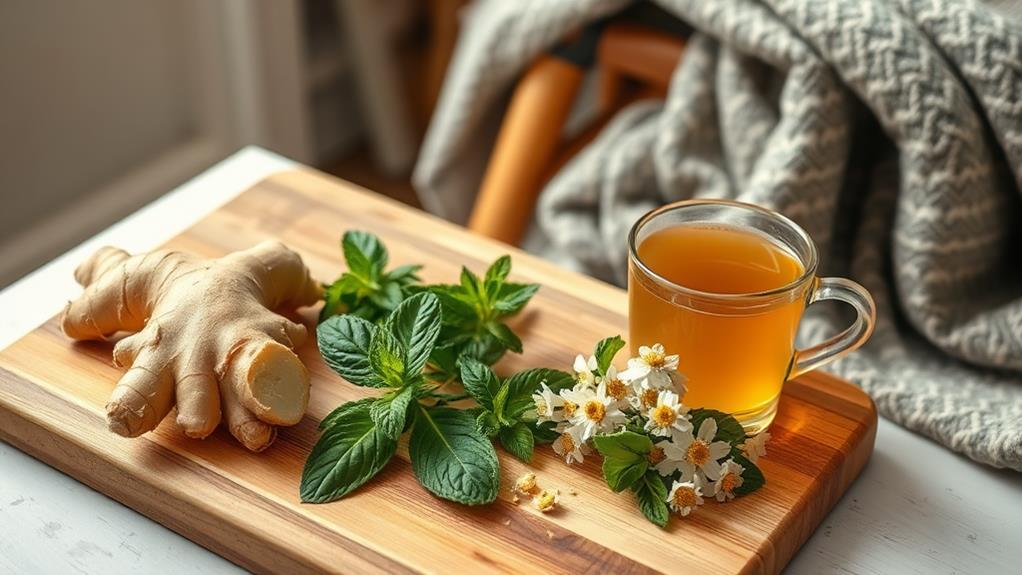
After tracking your food triggers, you may find that certain lifestyle adjustments can enhance your comfort and reduce bloating. One easy change is to eat slowly and chew your food thoroughly. This helps you swallow less air, which means less bloating and discomfort. You might be surprised how much this simple habit can help!
Engaging in regular physical activity, like taking a walk or practicing yoga, can also promote digestion. Plus, it's a great excuse to get moving!
Another tip is to drink beverages at room temperature instead of cold. Warm drinks can ease digestion and may help reduce bloating symptoms.
Don't forget about keeping a food diary! Writing down what you eat helps you spot any pesky food triggers or intolerances that could be causing your bloating.
Finally, consider gradually adding high-fiber foods to your diet. They're super important for digestive health, but it's best to introduce them slowly to avoid any unwanted bloating.
With these lifestyle modifications, you'll be on your way to feeling more comfortable in no time. So, why not give them a try? Your tummy will thank you!

